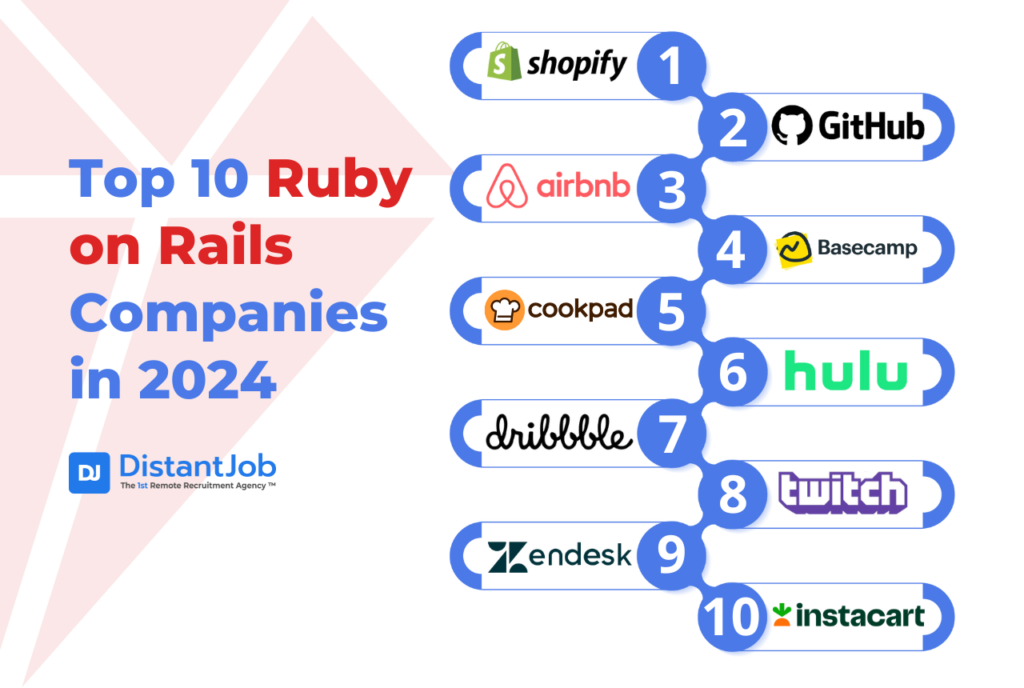The increasing need for responsive and robust web applications has elevated the visibility of Ruby on Rails companies. The RoR framework remains an excellent choice for web application development, known for its maturity, productivity, scalability, and ease of maintenance.
According to the Stack Overflow 2024 Developer Survey, Ruby ranks as the 19th most popular programming language among developers. More importantly, Ruby on Rails powers over 1 million websites globally, including many high-traffic platforms.
Considering this data, we can ask ourselves: Is Ruby on Rails dying? Despite debates about its declining popularity, Ruby on Rails maintains a robust and active community, with the RubyGems repository hosting over 186,000 gems.
Major companies as Shopify and Airbnb employ Ruby on Rails, due to its viability for large-scale applications. A recent Built In listing for Top Ruby on Rails Companies 2025 includes firms like UL Solutions, Atlassian, Apollo.io, Dynatrace, General Motors, MassMutual, Monday, Snap Inc., and CoreWeave.
While Ruby on Rails may not be as dominant as it once was, it remains a viable and powerful framework for web development. That’s why, in this blog, we’ll dive into the top Ruby on Rails companies of 2025 and answer some questions about their features, benefits, and common uses for developers and companies.
What is Ruby on Rails (RoR)?
Ruby on Rails (RoR) is an open-source web application framework written in Ruby. It follows the Model-View-Controller (MVC) architectural pattern, emphasizing the use of well-established software engineering patterns and principles, such as Convention over Configuration (CoC), Don’t Repeat Yourself (DRY), and the Active Record pattern.
Ruby on Rails, introduced in 2004, remains a key player in web development due to its:
- Rapid Development: Convention over configuration speeds up application building.
- Robust Ecosystem: Extensive gem library accelerates development tasks.
- Scalability: Powers high-traffic sites like Airbnb and GitHub.
- Cost-Effectiveness: Rails is an efficient framework that reduces development costs and time-to-market.
- Easy Prototyping: Ruby facilitates fast and quick MVP development for startups.
Ruby on Rails development services attract companies with its rapid prototyping capabilities, robust community support, and proven success in web application development.
Why Use Ruby on Rails
Ruby on Rails is a popular choice for web application development because it offers numerous benefits for both companies and developers. Its rapid development capabilities, cost-effectiveness, and robust ecosystem are just a few factors why many opt for this framework.
Your team can address several bottlenecks with Ruby, such as performance, scalability, and rapid prototyping. Ruby’s opinionated nature makes everything easier; there is only one way to develop architecture in Ruby, so the team doesn’t have to think much about how to design it. They can just go straight to code it.
We aren’t in 2004 anymore. Ruby isn’t a trend or a hype as it once was. Instead, it matured into a reliable solution for development from scratch in start-ups, small, and medium-sized companies. In other words, Ruby can help your company from day one to success.
Here’s why to use Ruby on Rails:
RoR for Companies:
- Cost-Effective: Faster development cycles can result in lower project costs.
- Scalability: Rails can handle high-traffic applications without requiring migration to microservices (while it can be used for microservices as well).
- Flexibility: Suitable for various types of web applications, from simple websites to complex platforms.
- Rapid Prototyping: RoR promotes quick MVPs by cutting costs and development time.
- Security: Built-in security features help protect against common web vulnerabilities.
- Long-term Stability: Mature framework with a track record of successful, large-scale deployments.
- Start-up Friendly: Due to Ruby’s opinionated nature, smaller teams or solo developers can deliver robust architecture faster.
RoR for Developers:
- Rapid Development: Rails’ convention over the configuration principle allows developers to build applications quickly.
- Highly Opinionated: Devs have fewer decisions to make and less cognitive overhead.
- Clean and Readable Code: Ruby’s syntax promotes writing expressive and maintainable code.
- Rich Ecosystem: Access to a vast library of gems for various functionalities with integrated functionality and stability.
- Testing Support: Built-in testing frameworks facilitate test-driven development.
- Active Community: Extensive community support for problem-solving and knowledge sharing.
- Rails Magic: Ruby allows you to modify existing classes at runtime. You can program the code to change itself without downtime.
These advantages make Ruby on Rails an attractive choice. Its combination of rapid development, scalability, and robust ecosystem continues to make it a valuable tool in the web development landscape.
Top 10 Ruby on Rails Companies in 2025

Here’s a list of the top 10 Ruby on Rails companies in 2025, known for their innovative use of the framework and significant contributions to the Ruby on Rails ecosystem. Here are some examples of websites built using the RoR framework
- Shopify: An e-commerce platform empowering businesses to create and manage online stores.
- GitHub: A web-based platform for version control and collaborative software development.
- Airbnb: A marketplace connecting travelers with unique accommodations around the world.
- Basecamp: A project management and team communication software.
- Cookpad: A global recipe-sharing and cooking community platform.
- Hulu: A streaming service offering on-demand television and movies, often with live TV options.
- Dribbble: An online community for designers to showcase their work and find inspiration.
- Twitch: A live streaming platform primarily focused on video games, but also featuring other content.
- Zendesk: A customer service software that provides tools for support, sales, and customer engagement.
- Instacart: A grocery delivery service that connects customers with local shoppers.
1. Shopify
A leading e-commerce platform that powers over 1 million businesses worldwide. Shopify’s scalable architecture demonstrates the framework’s ability to handle high-traffic and complex applications. RoR is used to encapsulate measurements and their units with the Measured repository, or to build Shopify apps using the Rails engine. All of which can be accessed from Shopify GitHub.
2. GitHub
The world’s largest code hosting platform, GitHub, relies heavily on Ruby on Rails for its backend infrastructure. The GitHub Docs site was originally a Ruby on Rails web app, but is currently a more heterogeneous platform.
3. Airbnb
While effective for complex bookings and user interactions, Airbnb has faced challenges, such as implementing a custom Zookeeper client pool. Despite this, Airbnb’s use of Rails showcases the framework’s scalability and adaptability. For enhanced security, Airbnb and other Rails applications often use tools like Brakeman, a security vulnerability scanner designed for Ruby on Rails.
Airbnb started as a classic Rails monolith, which is excellent for rapid iteration and getting a product to market quickly. After many challenges, Airbnb decided to migrate to MERN, not because Ruby couldn’t handle it alone. The real reason is that a modular monolith wasn’t enough to hold up all those requests at a global scale. Case in point: extremely high-traffic, low-latency services (like a global platform) might benefit from languages designed for raw speed and concurrency, such as Java or Go.
4. Basecamp
Basecamp continues to use the framework for its popular project management and team communication tools.
In fact, Basecamp is the company that created Ruby on Rails. David Heinemeier Hansson (also known as DHH), the co-founder and CTO of Basecamp (originally 37signals), extracted Rails from the development of the first version of Basecamp back in 2004.
Rails is not just Basecamp’s preferred framework; it’s deeply ingrained in their company’s philosophy and how they build software. They are continuously developing and improving Rails, and their own products (Basecamp, HEY.com, Write.as) are the primary dogfooding ground for new Rails features.
5. Cookpad
Cookpad’s development ecosystem revolves around Ruby and Ruby on Rails, supplying the foundation for their main application, assisting tools, and internal libraries. They use Ruby to create custom gems and create an API. Additionally, their widespread use of RSpec highlights a strong emphasis on thorough Ruby code testing.
6. Hulu
This popular streaming service uses its GitHub repository to show Ruby tools and libraries. Hulu may use Ruby for internal tools and integrations.
7. Dribbble
Dribbble, a popular platform for designers, extensively utilizes Ruby on Rails in its technology stack. The framework is employed for core platform development, API creation and maintenance, database management through ActiveRecord, testing and quality assurance, and custom gem development.
8. Twitch
While the main Twitch platform is not entirely built on Rails, the company employs Ruby for specific tools and services. These include the Twitch CLI (Command Line Interface) for developers, which is partially written in Ruby, and other internal tools that leverage the language’s simplicity and efficiency.
9. Zendesk
The company maintains numerous Ruby-based projects, including core components of its customer service platform, API clients, and various tools and libraries. Their use of Ruby extends to both backend services and developer tools, highlighting the language’s versatility in supporting Zendesk’s complex, customer-centric applications.
10. Instacart
A leading online grocery delivery platform extensively utilizes Ruby on Rails for various critical components of its infrastructure. They have developed numerous Ruby gems and libraries to enhance their development workflow, including tools for database management, API integrations, and performance optimization.
Why Companies Choose Ruby on Rails
Many companies choose Ruby on Rails over other frameworks due to several key advantages.
The framework’s rapid development capabilities, enabled by Rails’ convention over configuration principle, allow for faster development cycles and reduced time-to-market for new products and features.
This efficiency often translates to cost-effectiveness, resulting in lower development costs and quicker return on investment.
Ruby on Rails also offers impressive scalability, as demonstrated by high-traffic applications like Shopify and GitHub. It’s one of the best languages to build from an MVP to a fully developed modular monolith. However, when you scale out globally and a microservices architecture is a must-have, you might need to use something else. Still, Ruby stands out as a language that you can start your business with.
Plus, its rich ecosystem, featuring a vast library of gems (pre-built modules), allows developers to add functionality without reinventing the wheel. The framework benefits from strong community support, with an active Rails community providing ongoing assistance, resources, and frequent updates. Furthermore, Rails’ flexibility makes it suitable for various types of web applications, from simple websites to complex platforms.
Ruby on Rails Companies by Industries
Ruby on Rails has proven its versatility across various industries, powering some of the world’s most innovative and successful companies. To illustrate this diversity, we’ve compiled a comprehensive list of notable Ruby on Rails companies, categorized by industry sectors:
E-commerce and Retail
The rapid development of scalable online stores made Ruby on Rails a hit in e-commerce and retail. Its security features, eCommerce gems, and payment gateway integration make it ideal for businesses expanding online, such as:
- Shopify: Leading e-commerce platform powering millions of online stores.
- Etsy: Global marketplace for unique and creative goods.
- Groupon: Deal-of-the-day website offering discounted gift certificates.
Travel and Hospitality
The travel and hospitality sector has embraced Ruby on Rails for its robust capabilities in managing complex booking systems and large user databases, like payment processing and mapping.
- Airbnb: Online marketplace for lodging and tourism experiences.
- Couchsurfing: Social networking service for travelers.
- Hotels.com: Online accommodation booking website.
Technology and Development
The tech sector widely uses Ruby on Rails for its RoR’s convention-over-configuration principle, and its vast gem library facilitates rapid prototyping and agile development.
- GitHub: The World’s largest code hosting platform.
- Basecamp: Project management and team communication tool.
- Heroku: Cloud platform as a service supporting Ruby on Rails.
Entertainment and Media
Ruby on Rails’ quick development cycle enables fast feature implementation, crucial in this dynamic industry. The framework excels at handling large data volumes, making it ideal for extensive media libraries and UGC management.
- Hulu: Popular streaming service.
- Twitch: Live-streaming platform for gamers.
- SoundCloud: Online audio distribution platform.
Food and Recipe Services
Ruby on Rails’ rapid development enables quick implementation of features like recipe management, ingredient parsing, and nutritional calculations.
- Cookpad: Global recipe-sharing service.
- Instacart: Online grocery delivery and pick-up service.
- Blue Apron: Ingredient-and-recipe meal kit service.
Professional Networks and Job Platforms
Ruby on Rails has become popular for professional networks and job platforms due to its ability to handle complex interactions and large databases efficiently.
- Dribbble: Community for designers to share their work.
- AngelList: Website for startups, angel investors, and job-seekers.
- Fiverr: Online marketplace for freelance services.
Customer Service and Support
Ruby on Rails offers robust tools for ticketing systems, live chats, and self-service portals.
- Zendesk: Customer service software company.
- Intercom: Customer messaging platform.
- Freshworks: Customer engagement software provider.
Pros and Cons of Ruby on Rails
Understanding the advantages and disadvantages of Ruby on Rails helps in making informed decisions about whether the framework aligns with their project requirements and long-term goals.
To provide a comprehensive view of Ruby on Rails for companies, let’s examine its pros and cons in a comparative table:
| Aspect | Pros | Cons |
| Development Speed | Rapid development and prototyping | Performance can be slower compared to some other frameworks |
| Configuration | The convention-over-configuration principle saves time | It can be overkill for simple, static websites |
| Community Support | Large, supportive community | It has a steep learning curve for beginners |
| Ecosystem | Extensive library of gems (plugins) | Upgrading between major versions can be challenging |
| Testing | Built-in testing frameworks | Not ideal for real-time features without additional tools |
| Startup Suitability | Good for creating MVPs and startups | Scalability issues may arise with massive applications |
| Database Operations | Active Record ORM simplifies database operations | Less control over low-level operations compared to other frameworks |
This comparison highlights that while Ruby on Rails offers significant advantages in terms of development speed and ease of use, companies need to carefully consider their specific project requirements and long-term goals when deciding to use this framework.
As we’ve seen, the key to success for Ruby on Rails companies is understanding their strengths and limitations and using their capabilities to meet the project’s specific needs.
For companies considering Ruby on Rails for their next project, it’s essential to hire skilled developers who not only understand the technical aspects of the framework but also have experience in your specific industry.
This combination of technical expertise and domain knowledge can significantly impact the success of your RoR-based application.
Conclusion
Ruby on Rails is far from deprecated. It matured from a trend in 2004 into a solid programming language. Important companies have been successful from start-ups and small businesses, paving their way to medium and global scale.
Ruby’s best qualities for companies are rapid prototyping and an astonishing performance when it comes to modular monoliths. However, when it comes to using microservices, there are better options out there (especially a multi-language approach).
Don’t forget that starting your business with microservices can be pretty expensive in the long run. Using a robust modular monolith will give you a better way to funnel your resources. That shouldn’t be a surprise, as each stage of scalability comes with its own needs and challenges.





